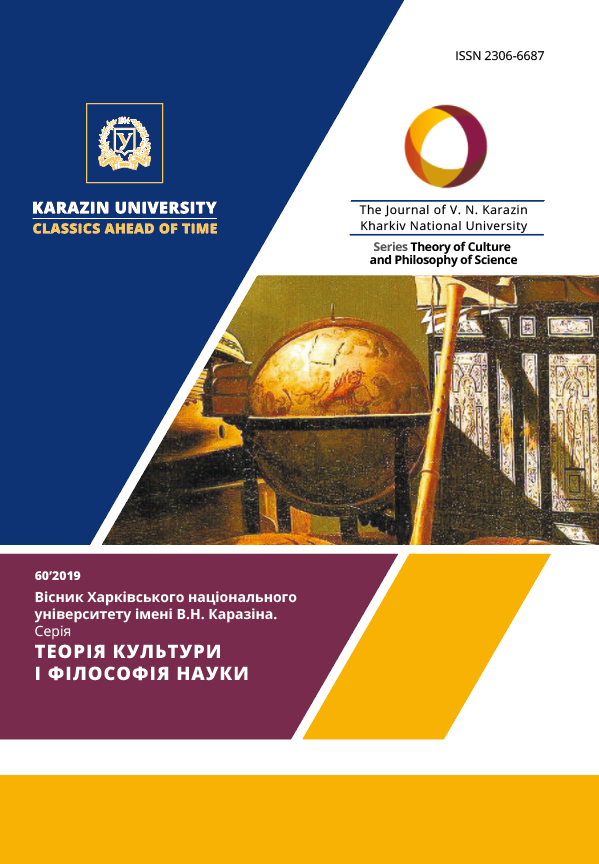MAN IN THE EPOCH OF TECHNOLOGICAL SHIFTS
IN SEARCHING FOR SUPPORT
Abstract
Modern technologies are an indispensable component of the entire space of a person’s life/being, acquiring a new configuration at the beginning of the 21st century. This situation has actualized the ontological anthropological dimension of the technological shifts of the present, transforming human life and vital activity. The objective of the study is to determine the configuration of modern technology, which produces the paradox of total technological being with a danger of “loosing human physicality” and loss of human personality. This situation emphasizes the ambivalence of the relationship “man – technology”: a person actively creates and uses technological products, but at the same time the latter directly affect the formation of his personality. Technologies transform worldview discourses, affirming a new stage in the development of mankind that requires a rethinking of the basic constants of human existence/preservation. It is noted that modern technology is a new intermediary between man and nature; they change not only the natural world, but also “encroach” on human nature that holds danger of transforming a person into an element of engineering/technology.
It is also emphasized that in the era of accelerated technologicalization, research discourse focuses on the possibilities of a new augmented and substituted reality. At the same time, a person physically still exists on the platform provided by the Earth, which provokes new problems between them. The impact of technology on nature and man is comprehensive. In this context, the problem of “Being a human being” (Miroslav Popovich) acquires a new sound.
The article insists on urgent necessity to find support in a world that is under the control of technological innovation. In this context, the ethical imperative of Hans Jonas “one must be involved in existence” takes on a new meaning. This situation requires a rethinking of the relationship “man – technology – nature” in the coordinates “you should/should not”, which reflects both technological development and the environmental crisis of the beginning of the 21st century. It is emphasized that the ontological anthropological dimension of technological reality provides new opportunities for exploring the relationship “man – Earth”, where the latter is the matrix of human life/being.
Downloads
References
Андрос Є. І. Грані людського буття: позитивні та негативні виміри антропокультурного. Бівалентність людського єства та проблема метафізичного зла. Київ: Наукова думка, 2010. С. 6–86.
Йонас Г. Принцип відповідальності. У пошуках етики для технологічної цивілізації / пер. з нім. А. Єрмоленко, В. Єрмоленко. Київ: Лібра, 2001. 400 с.
Кисельов М. М., Гардащук, Т. В., Зарубицький, К. Є, Деркач, В. Л. та Вишняк Є. Д. Екологічні виміри глобалізації. Київ: Парапан, 2006. 260 с.
Мелков Ю. А. Человекомерность постнеклассической наук. Киев: ПАРАПАН, 2014. 254 с.
Степин В. С. Теоретическое знание: структура, историческая эволюция. Москва: Прогресс-Традиция, 2000. 744 с.
Фромм Э. Человеческая ситуация / пер. с англ. Д. Леонтьева. Москва: Смысл, 1995. 239 с.
Хейлз К. Н. Як ми стали постслюдством: Віртуальні тіла в кібернетиці, літературі та інформатиці / пер. з англ. Є. Т. Марічева. Київ: Ніка-Центр, 2013. 426 с.
Шваб К. Четверта промислова революція. Формуючи четверту промислову революцію. Харків: КСД, 2019. 416 с.
Ямпольский М. Экран как антропологический протез. 2012. [Электронный ресурс]. URL: http://royallib.com/read/yampolskiy_mihail/ekran_kak_antropologicheskiy_protez.html#0
Bailey L. H. The Holy Earth New York: Charles Scribner’s Sons, 1915. [Электронный ресурс]. URL:
Steffen W., Crutzen P., Mcneill J. The Anthropocene: Are Humans Now Overwhelming the Great Forces of Nature. Ambio. 2008. №36. P. 614–621. https://www.pik-potsdam.de/news/public-events/archiv/alter-net/former-ss/2007/05-09.2007/steffen/literature/ambi-36-08-06_614_621.pdf
Thomas M. A. The Voices of Nature: Toward a Polyphonic Conception of Philosophy. Telos. 2016. Issue 177. P. 145–167. https://doi.org/10.3817/1216177145.
Warwick K. Homo Technologicus: Threat or Opportunity? Philosophies. 2016. No. 1. P. 199–208. https://doi.org/10.3390/philosophies1030199. URL: https://www.mdpi.com/2409-9287/1/3/199.
Citations
THE TRANSHUMANIS’M PERSPECTIVE: CONCEPTS OF THE POSTHUMAN
Kiselyova Tetyana (2023) The Journal of V. N. Karazin Kharkiv National University, Series "Philosophy. Philosophical Peripeteias"
Crossref




